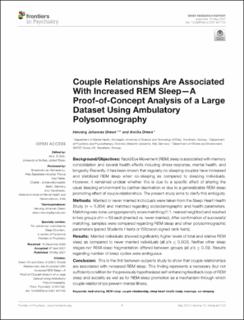| dc.contributor.author | Drews, Henning Johannes | |
| dc.contributor.author | Drews, Annika | |
| dc.date.accessioned | 2022-09-27T07:50:29Z | |
| dc.date.available | 2022-09-27T07:50:29Z | |
| dc.date.created | 2021-05-12T10:25:39Z | |
| dc.date.issued | 2021 | |
| dc.identifier.citation | Frontiers in Psychiatry, 2021, 12, 1-9. | en_US |
| dc.identifier.issn | 1664-0640 | |
| dc.identifier.uri | https://hdl.handle.net/11250/3021622 | |
| dc.description.abstract | Background/Objectives: Rapid Eye Movement (REM) sleep is associated with memory consolidation and several health effects including stress response, mental health, and longevity. Recently, it has been shown that regularly co-sleeping couples have increased and stabilized REM sleep when co-sleeping as compared to sleeping individually. However, it remained unclear whether this is due to a specific effect of altering the usual sleeping environment by partner deprivation or due to a generalizable REM-sleep promoting effect of couple relationships. The present study aims to clarify this ambiguity. Methods: Married or never married individuals were taken from the Sleep Heart Health Study (n = 5,804) and matched regarding sociodemographic and health parameters. Matching was done using propensity score matching (1:1, nearest neighbor) and resulted in two groups of n = 69 each (married vs. never married). After confirmation of successful matching, samples were compared regarding REM sleep and other polysomnographic parameters (paired Students t-tests or Wilcoxon signed-rank tests). Results: Married individuals showed significantly higher levels of total and relative REM sleep as compared to never married individuals (all p's ≤ 0.003). Neither other sleep stages nor REM-sleep fragmentation differed between groups (all p's ≥ 0.29). Results regarding number of sleep cycles were ambiguous. Conclusion: This is the first between-subjects study to show that couple relationships are associated with increased REM sleep. This finding represents a necessary (but not sufficient) condition for the previously hypothesized self-enhancing feedback loop of REM sleep and sociality as well as for REM-sleep promotion as a mechanism through which couple relationships prevent mental illness. | en_US |
| dc.language.iso | eng | en_US |
| dc.publisher | Frontiers | en_US |
| dc.rights | Navngivelse 4.0 Internasjonal | * |
| dc.rights | Navngivelse 4.0 Internasjonal | * |
| dc.rights.uri | http://creativecommons.org/licenses/by/4.0/deed.no | * |
| dc.subject | co-sleeping | en_US |
| dc.subject | marriage | en_US |
| dc.subject | sleep heart health study | en_US |
| dc.subject | couple relationship | en_US |
| dc.subject | REM sleep | en_US |
| dc.subject | bed-sharing | en_US |
| dc.title | Couple Relationships Are Associated With Increased REM Sleep—A Proof-of-Concept Analysis of a Large Dataset Using Ambulatory Polysomnography | en_US |
| dc.type | Peer reviewed | en_US |
| dc.type | Report | en_US |
| dc.description.version | publishedVersion | en_US |
| dc.rights.holder | Copyright © 2021 Drews and Drews | en_US |
| dc.source.pagenumber | 9 | en_US |
| dc.source.volume | 12 | en_US |
| dc.source.journal | Frontiers in Psychiatry | en_US |
| dc.identifier.doi | 10.3389/fpsyt.2021.641102 | |
| dc.identifier.cristin | 1909613 | |
| dc.source.articlenumber | 641102 | en_US |
| cristin.ispublished | true | |
| cristin.fulltext | original | |
| cristin.qualitycode | 1 | |

